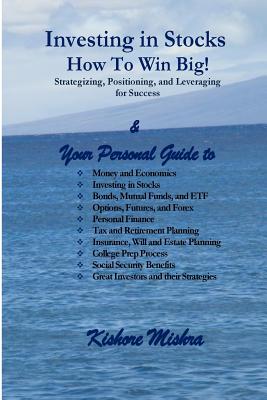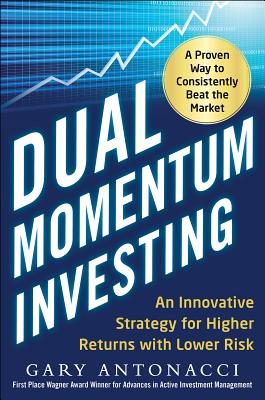商品描述
An informed investor is an intelligent investor, and an informed decision is an intelligent decision. However, we make wrong decisions mainly because we do not have all the information or simply are not knowledgeable about something. Many people are fearful about the stock market because they have been burnt in the past or know someone who has lost money in the past. They are not wrong, and they are not alone. We are not taught about finance, investing, and stocks in school or college. We learn it by trial and error, and along the way, many of us are left with a bad taste that makes us fearful or overly conservative in our investments. The recent scars of 2000 and 2008 have been so deep that many individual investors just left the field. In addition, the perception is that one has to be an expert in economics and spends a lot of time to be successful in investing. It is not true. We can build basic understandings of how things work slowly and steadily. This book will go a long way towards that and will make the process easier. There are no recipes for overnight success or cut-and-dry method to be successful in the stock market. It is the proverbial slow-but-patient tortoise that beat the fast-but-inconsistent fox to the finish line. There are many ways to make money, and plenty of ways to lose money. Investing in stocks is a learning process, and you will walk sure-footed as you gain more experience. This book will be your companion with many useful tips, insights into how things work, and proven and successful strategies. The book is divided into four sections. Section I builds the foundation for a long-lasting investing journey - it introduces and refreshes basic economics, accounting, math, government systems, and legal implications. Section II brings the investment choices available in the market place with their pros and cons. However, the main focus and coverage is on investing in stocks based on fundamental analysis. It provides an in-depth analysis on how the stock market works and offers strategies to make money consistently while minimizing risk. Section III discusses about other investment choices, such as Mutual funds, ETFs, Options, Futures, Forex, and real estate. Section IV discusses about personal finances, how to make more money at work, how to reduce expenses without sacrificing benefits, and how to be savvy about taxes and tax planning. I strongly believe that this book will be your true friend and source of knowledge that you could always count on. When I look back, my initial investment days were hit and miss. I had very little understanding of how and why the stock price changes - I would consider a stock cheap and buy when it drops by 50 percent and keep putting more money as the stock went down further, only to see that the company went out of business in a few years. I did not give up. I studied books and analyzed each investment in details, and tried to understand why it happened the way it happened. Though the stock market is highly unpredictable, there are a few things that repeat in clockwork precision. Stock market goes through cycles. Both the positivity and the negativity get highly amplified compared to the reality. The market and stock price would go up very high or go down very low diverging far away from the real intrinsic value. These are the points where you can lose a lot or make a lot. Speculation can make you some quick money, but on a continual basis, you would lose what you gained. On the contrary, if you can choose stocks that are fundamentally strong and pick them up when they are out of favor, it increases the probability of generating good returns while reducing the risk of losing money. It is the experience, the patience, the discipline, and the desire to be successful that will make you a good investor. Stock investment is part science, part art, but mostly it is the mind and the psychology.
商品描述(中文翻譯)
一位知識淵博的投資者是一位智慧的投資者,而一個明智的決策則是一個聰明的決策。然而,我們做出錯誤的決定主要是因為我們沒有所有的信息,或是對某些事情缺乏了解。許多人對股市感到恐懼,因為他們在過去遭受過損失,或是認識曾經虧損的人。他們並不是錯的,也並不孤單。我們在學校或大學並沒有學到有關財務、投資和股票的知識。我們是透過試錯學習的,而在這個過程中,許多人留下了不好的印象,使我們在投資上變得恐懼或過於保守。2000年和2008年的創傷如此深刻,以至於許多個人投資者選擇退出這個領域。此外,人們普遍認為,成功投資必須是經濟學專家,並花費大量時間。這並不正確。我們可以慢慢而穩定地建立對事物運作的基本理解。本書將在這方面大有幫助,並使這個過程變得更容易。沒有任何一種快速成功的秘訣或簡單明瞭的方法可以在股市中獲得成功。正如俗話所說,緩慢但堅持的烏龜擊敗了快速但不穩定的狐狸,抵達終點。賺錢的方式有很多,而虧錢的方式也不在少數。投資股票是一個學習的過程,隨著經驗的增長,你會更加穩健地行走。本書將成為你的夥伴,提供許多有用的建議、對事物運作的見解,以及經過驗證的成功策略。本書分為四個部分。第一部分為持久的投資旅程奠定基礎 - 介紹並刷新基本的經濟學、會計、數學、政府系統和法律影響。第二部分介紹市場上可用的投資選擇及其優缺點。然而,主要的焦點和內容是基於基本面分析的股票投資。它提供了對股市運作的深入分析,並提供了在最小化風險的同時穩定獲利的策略。第三部分討論其他投資選擇,如共同基金、ETF、期權、期貨、外匯和房地產。第四部分討論個人財務,如何在工作中賺取更多的錢,如何在不犧牲福利的情況下減少開支,以及如何精明地處理稅務和稅務規劃。我堅信這本書將成為你真正的朋友和知識來源,你可以隨時依賴。回首往事,我的初期投資日子充滿了波折。我對股票價格變化的原因幾乎沒有了解 - 我會認為一隻股票便宜,當它下跌50%時就買入,並在股票進一步下跌時不斷投入更多資金,最終卻看到公司在幾年內倒閉。我沒有放棄。我閱讀書籍,詳細分析每一項投資,並試圖理解為什麼會發生這樣的情況。儘管股市高度不可預測,但有一些事情是以精確的時鐘運行重複出現的。股市會經歷周期。正面和負面的情緒相比現實會被高度放大。市場和股價會大幅上升或下降,遠離真正的內在價值。在這些時刻,你可能會虧損很多或賺取很多。投機可以讓你快速賺錢,但長期來看,你會失去所獲得的收益。相反,如果你能選擇基本面強勁的股票,並在它們不受青睞時買入,則會提高獲得良好回報的概率,同時降低虧損的風險。經驗、耐心、紀律和成功的渴望將使你成為一位優秀的投資者。股票投資既是科學,也是藝術,但最重要的是心態和心理。
作者簡介
Kishore Mishra lives in Silicon Valley and works in computer chip design. He received BSEE from NIT, Rourkela, a premier engineering institution in India. Later, he received MSEE form University of Toledo, Ohio. Early on, he worked with great companies, such as Texas Instruments and Intel. Lately, he has been an entrepreneur and has founded successful start-up companies. In 2004, he co-founded ASIC Architect, Inc., an Intellectual Property company. As CEO, he led the development of leading-edge IPs, leading up to acquisition by Gennum in 2008. His interests are in chip development, PCI Express, and memory controller. Recently, he worked on multi-core, cache-coherent NOC (Network on Chip) design. He holds several US patents. He is the author of "Advanced Chip Design," which has been on Amazon's bestseller list regularly. Besides first love for computer design, he has deep love for Economics and investing in stocks. What started as a casual curiosity is now a major involvement. He focuses on companies with strong fundamentals (good management, solid balance sheet, increasing or steady income, positive cash flow, dividends, and stock buyback). He starts taking positions when they are out of favor and price is cheap. He does not have a set time for holding - from a few weeks to a few months. His investment philosophy is based on increasing the probability of success and positioning for success. Once the goal (10-20% gain) is achieved, he moves the money to another investment that provides better probability. This has been working out well for the last several years where market has been moving sideways. If he were to invest coming off a market crash like the 2009, he would consider holding long-term. He generally keeps some cash for good opportunities. He sometimes takes concentrated positions with solid companies that have been unduly punished. He uses margin judiciously with a high degree of safety. He uses the market inefficiency and leverage to make many small (5%-20%) gains that eventually add up to respectable numbers. He believes that success in the stock market largely depends on the overall strategy, positioning to win, using leverage judiciously, and having a plan to deal with possible market crash. He learns every day. He keeps an open mind and studies the great investors of all times. He loves writing, and this book is the product of his passion for investing and the desire to share his thoughts and experience with fellow investors.
作者簡介(中文翻譯)
基肖爾·米什拉(Kishore Mishra)居住在矽谷,從事電腦晶片設計工作。他在印度的頂尖工程學院 NIT Rourkela 獲得電機工程學士學位(BSEE),之後又在俄亥俄州的托萊多大學獲得電機工程碩士學位(MSEE)。早期,他曾在德州儀器(Texas Instruments)和英特爾(Intel)等知名公司工作。最近,他成為一名企業家,創辦了成功的初創公司。2004年,他共同創立了 ASIC Architect, Inc.,這是一家專注於智慧財產的公司。作為首席執行官,他領導了尖端智慧財產的開發,並於2008年被 Gennum 收購。他的興趣包括晶片開發、PCI Express 和記憶體控制器。最近,他專注於多核心、快取一致性的 NOC(Network on Chip)設計。他擁有多項美國專利,並且是《進階晶片設計》(Advanced Chip Design)的作者,該書經常出現在亞馬遜的暢銷書榜上。除了對電腦設計的熱愛外,他對經濟學和股票投資也有深厚的興趣。最初的好奇心如今已成為他的一項重要投入。他專注於基本面強勁的公司(良好的管理、穩健的資產負債表、穩定或增長的收入、正的現金流、股息和股票回購)。當這些公司不受市場青睞且價格便宜時,他會開始進行投資。他對持有的時間沒有固定的規定,可能是幾週到幾個月不等。他的投資哲學基於提高成功的概率和為成功定位。一旦達到目標(10-20%的收益),他會將資金轉移到其他提供更好概率的投資上。在過去幾年市場橫盤整理的情況下,這種方法運行良好。如果他在像2009年那樣的市場崩盤後進行投資,他會考慮長期持有。他通常會保留一些現金以便把握良機。他有時會對那些受到不當懲罰的優質公司進行集中投資。他謹慎地使用保證金,並保持高安全性。他利用市場的低效率和槓桿來獲取許多小的(5%-20%)收益,最終累積成可觀的數字。他相信,股票市場的成功在很大程度上取決於整體策略、贏得的定位、謹慎使用槓桿以及應對可能市場崩盤的計劃。他每天都在學習,保持開放的心態,研究歷史上偉大的投資者。他熱愛寫作,這本書是他對投資的熱情以及與其他投資者分享他想法和經驗的願望的產物。











